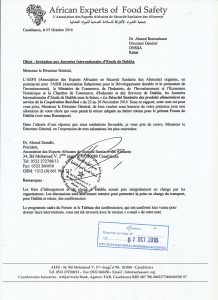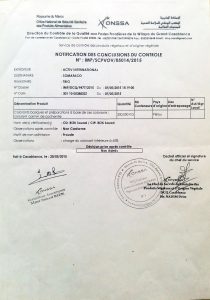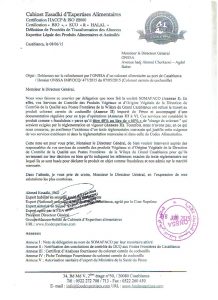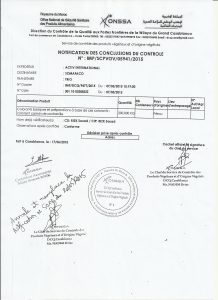There are about ten years, a food operator of Fez to which the USFDA (US Agency for control of food and drugs) had refused to register one of its products for export, asked for my opinion on the case (my archives). The procedure FDA in force needs the industrial unit designate a person (expert) to which the company delegates the quality to perform the registration process of products on its behalf with the federal agency. The original document of power delegation must be sent at the same time as the filled registration dossier. In this case, the delegation was made to an official of the EACCE (Autonomous Establishment of Control and Coordination of Exports) which, instead of putting his name and his quality to the recording folder as required by the FDA regulations, indicated instead name of the EACCE. He probably thought, perhaps as they do with their counterparts on the other side of the Mediterranean, that he had an advantage to play. Moreover, examination of how the case was handled shows clearly that the official in question was new for such a work. This added to this was that the file in question was rejected by the US agency and the food unit had to resume, in such uncomfortable position, the process from the start. It should be explained that the FDA says on its website that it preserves the right to bring to justice anyone guilty of giving fraudulent information. In the case at hand, the Moroccan State, by the lightness of an unconscious official, becomes virtually likely to be sued by the US authorities.
The FDA is now more than a century and, following the Second World War, attended many of regulatory agencies of European countries who, for some of them lost their archives and protocols, to resume operations on correct bases. This is probably why, when setting up their own agency EFSA (European Food Safety Agency), Mr. Romano Prodi, President of the EU Commission at the time, made the trip to Washington to see and draw their inspiration from the FDA experience. But if the consensus to implement EFSA was acquired, European countries were far from agreed on many points starting with where to put the headquarters of the European body. The French have fiercely defended their view to host the headquarters of the agency. The fact is that Italians (Romans) were precursors, centuries before Paris, for what has to do with food regulation. But if common sense and logic prevailed by awarding the EFSA headquarters to Parma in Italy, the French have given since signs of irritation and act as EFSA was of little importance. To date, the French prefer whenever they can put forward their national regulatory agencies in precedence over the European agency. Knowing that the French are Cartesian fundamentally, the question arises why this time blindness. The answer might come from the fact that playing the EFSA card in these circumstances would carry risk to the prestige of France in its former African colonies; before which the colonial metropolis has glorified for centuries the French expertise and know-how, the best you could have in the world. Indeed, assuming that France plays the game of promoting EFSA’s position, as required by the treaties of the EU, this means that French service providers, which abound in our latitudes, should promote EFSA’s image in priority. But then, once the promotional work done, a service provider of any other EU countries might do the trick, for example in the handling of files of food products export to the EU. France, on what she considers her “backyard” of African countries, and is still reluctant to consider even today otherwise than as “overseas territories” (my archives), would have to do work that benefit European citizens before its nationals without anything in return for the latters. In any event, this does not correspond to the image Metropolitan France has built on itself for centuries with its former colonies. So there is blockage. This contrasts clearly with US providers who promote FDA regulation regardless of the State of the Union to which they belong. But if we consider the issue from another angle, we have another image. For if the FDA rules must be respected for the entry of goods into the US market, and regardless of the input port; as regards the EU, it is the regulations of the country that first receives the goods that prevail. Like most goods Francophone Africa intended for the EU go mainly to France, or via France, the Metropolis, financially speaking, has everything to gain by continuing to highlight its own regulation before any other. But its European partners observe the process and they say: if the French do what they do why not us. Obviously, the choice between putting forward national legislation or that of the EFSA is agonizing for everyone. It seems highly likely that for “solving” this conundrum shared by all countries of the EU that a tacit consensus emerged for the massive promotion of private service providers in Africa. Across the continent, we have now consultancy firms, mostly French but also other EU countries, who are willing to certify you everything you want and its opposite to the extent that you have enough to pay. They have in common that all are accredited, something they have paid for, by a body or other in their own country, manage to not being accountable for their actions before anyone, and certainly not before the courts of African countries where they earn their money. They also have the solidarity of the EU countries to block any product that is not certified by one or other of these well instructed agents. Best of all, a Moroccan body but vestige of the protectorate, i.e. the EACCE, which has simply made the change in the title, that ensures in Morocco the implementation of these requirements that agricultural EU imposes on us and other African countries outside reference standards for International trade.
An example, from my archives, illustrates anarchy and lack of credibility of offices that are active here, and certainly the same in other African countries, in the field of certification and how they use EACCE in Morocco for serving their purpose. Just a few years ago an operator of Marrakech has requested my assistance in the certification of its argan oil of food grade. Morocco has, once is not custom, a norm for this article. During my working visit, the operator informs me, in essence, that he already exports the product he wanted but certified under “cosmetic label”. Seeing my surprise, he informed me that such a solution was found for him by a French consultant who certified the product and found a buyer of Paris for his article. Once the client receives the product, he simply changes the labeling. The product exported under seemingly cosmetic label becomes so a food. To my question about the role of EACCE in this, his response was that when a responsible of this organism sees the signing of a French certification, the product passes as a letter in the mail.
Now if we look at the web sites of ONSSA and EACCE, it seems like they got the same prerogatives (see web sites: http://www.onssa.gov.ma/ and http://www.eacce.org.ma/) on what is relating to food safety. The problem is that the action of the EACCE follows that of ONSSA at the time of preparation of the export operation. So, whatever the angle of view by which we can consider this imbroglio, it appears that the intervention of the EACCE undermines the prerogatives of ONSSA and, consequently, is antithetical to the same law that puts all national food chain under the authority of ONSSA. Unless you consider that, contrary to the spirit and letter of the law 28-07 of safety of food products in force, national food processors prepare products for us Moroccans for which notice of ONSSA is sufficient and products intended for export for which a “review” by EACCE is required. If that were the case, this vision would at least have the merit of being consistent with the Viziriel Order of 1944 establishing « Technical Control of Manufacturing and Packaging of the Exportation of Morocco » (Original mission of the current EACCE).



